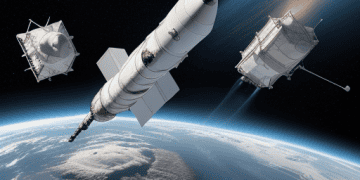Export control reforms affecting space systems and technologies are advancing into their next phase, with the change in administration expected to have little effect on the process, according to Chirag Parikh, executive secretary of the National Space Council.
Speaking on November 6 at a meeting organized by the Commerce Department to discuss the reforms, Parikh explained that the changes aim to modernize U.S. export regulations, ease controls on less sensitive space-related items, and enhance the competitiveness of the U.S. space industry, while fostering international space partnerships.
Parikh noted that a key goal of the Biden administration has been to support a competitive U.S. commercial space sector and provide clarity on regulatory and export control matters. As the administration transitions, Parikh pointed out that there is bipartisan support for continuing these initiatives.
U.S. Export Control Framework
At the core of U.S. export controls are two main regulations: the International Traffic in Arms Regulations (ITAR) and the Export Administration Regulations (EAR). ITAR, managed by the State Department, governs the export of defense-related items on the U.S. Munitions List (USML), while EAR, administered by the Commerce Department, deals with less-sensitive technologies with economic or strategic value.
ITAR imposes strict limitations on space systems with military applications, such as satellite imagery and propulsion technologies, which can hinder U.S. companies’ ability to compete globally. In contrast, EAR governs less sensitive items like certain commercial satellites and antennas, allowing more flexibility in international collaboration.
The proposed reforms seek to move certain items from the USML under ITAR to the CCL under EAR, reducing regulatory burdens for U.S. space companies, promoting international partnerships, and ensuring U.S. competitiveness in the global space sector.
Adapting to a Changing Space Landscape
Matthew Borman, principal deputy assistant secretary for export administration at the Commerce Department, highlighted the rapid transformation in space technology and industry. He emphasized the need for export control policies to evolve to keep pace with this changing environment, where more countries and companies are entering space.
The State Department’s proposed rule includes adjustments to the USML by reclassifying some space technologies, including dual-use systems that could be exempted from ITAR licensing. Technologies that enable proximity operations, essential for servicing and rendezvous maneuvers in space, are particularly relevant for NASA, which has advocated for fewer restrictions to facilitate international collaboration.
Michael Tu, an export control specialist at NASA, noted that the agency aims to reduce obstacles with “trusted partners” and that reclassification under EAR could ease cooperation for NASA’s international projects, such as the Lunar Gateway and Mars Sample Return missions.
Industry Feedback and Ongoing Discussions
Some companies have expressed concerns that the proposed reforms do not go far enough, especially regarding technologies like synthetic aperture radar (SAR) satellites. U.S. companies have raised questions about why advanced SAR satellites, which are commercially available from foreign competitors, are still restricted under ITAR.
Chris Weil from the State Department’s Directorate of Defense Trade Controls explained that some items on the ITAR Munitions List may be eligible for reassessment under EAR. The government has encouraged companies to provide specific feedback on the proposed rule.
A public comment period, which closed on November 22, allowed industry representatives to weigh in on the proposed changes.
New Export Control Rules and Proposals
The U.S. Department of Commerce’s Bureau of Industry and Security (BIS) and the State Department’s Directorate of Defense Trade Controls (DDTC) released four export control rules for space technologies on October 17. Two of these rules are now in effect, while the other two are still in the proposal stage.
State Department Proposed Rule: This rule proposes updates to USML Categories 4 and 15, including reclassification of some space-related defense items. It seeks to streamline exports of commercial technologies by removing certain items from ITAR and transferring them to EAR, enabling smoother international cooperation.
Commerce Department Final Rule: This rule exempts certain spacecraft and related technologies from needing EAR licenses for exports to Australia, Canada, and the United Kingdom, facilitating smoother cooperation with these allied nations in space operations.
Commerce Department Interim Final Rule: This rule lifts EAR license requirements for select spacecraft parts and components for around 40 countries in the Wassenaar Arrangement. It also expands export permissions for NASA’s Space Act Agreements and certain exports to Russia for International Space Station missions under EAR standards.
Commerce Department Proposed Rule: This proposed rule aims to align EAR space-related export controls with ITAR revisions, simplifying compliance for companies while maintaining national security.
Get the newest updates in supply chain logistics news on The Supply Chain Report. Visit ADAMftd.com for free international trade tools..
#SpaceExportReform #TradePolicyUpdate #AerospaceRegulations #GlobalTradeShifts #TechExportControl















